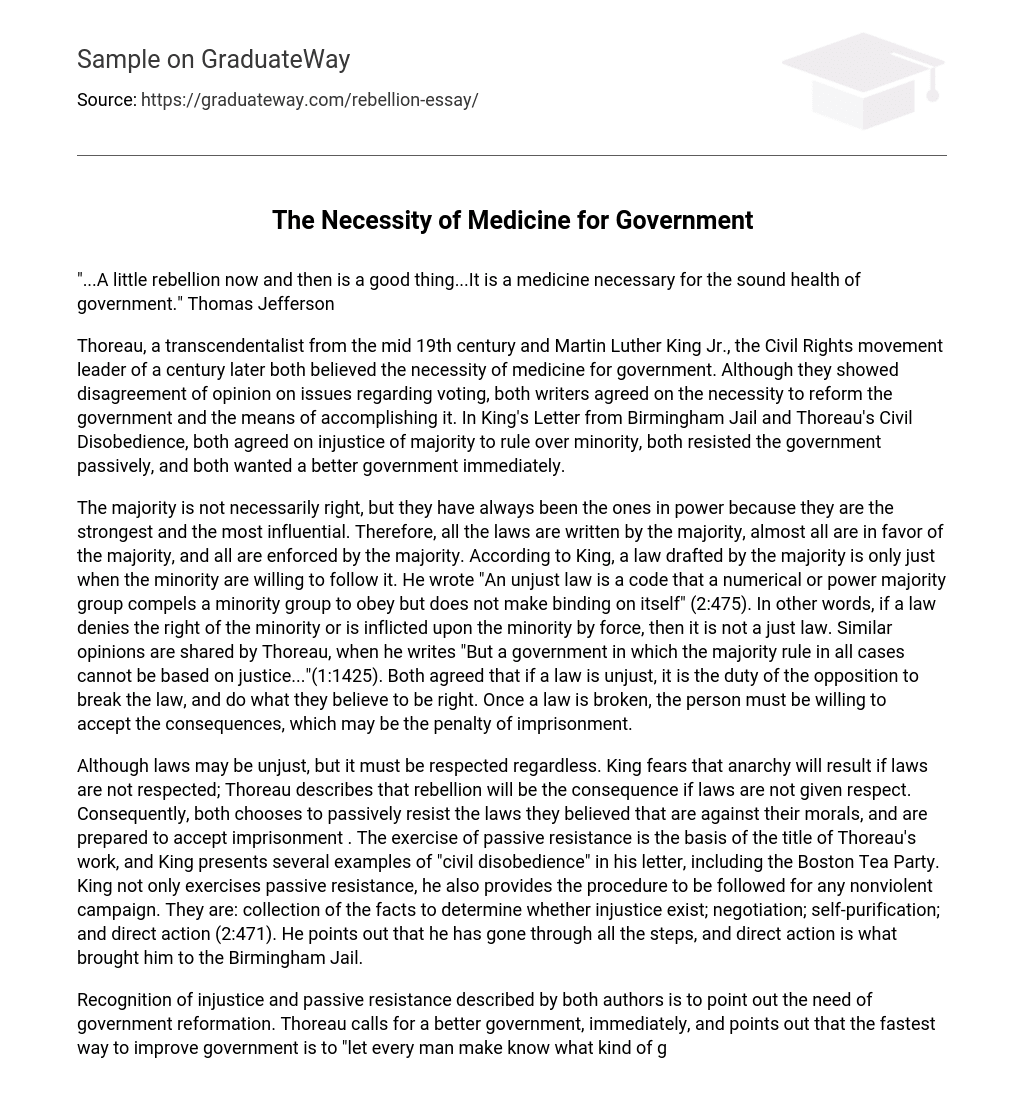“…A little rebellion now and then is a good thing…It is a medicine necessary for the sound health of government.” Thomas Jefferson
Thoreau, a transcendentalist from the mid 19th century and Martin Luther King Jr., the Civil Rights movement leader of a century later both believed the necessity of medicine for government. Although they showed disagreement of opinion on issues regarding voting, both writers agreed on the necessity to reform the government and the means of accomplishing it. In King’s Letter from Birmingham Jail and Thoreau’s Civil Disobedience, both agreed on injustice of majority to rule over minority, both resisted the government passively, and both wanted a better government immediately.
The majority is not necessarily right, but they have always been the ones in power because they are the strongest and the most influential. Therefore, all the laws are written by the majority, almost all are in favor of the majority, and all are enforced by the majority. According to King, a law drafted by the majority is only just when the minority are willing to follow it. He wrote “An unjust law is a code that a numerical or power majority group compels a minority group to obey but does not make binding on itself” (2:475). In other words, if a law denies the right of the minority or is inflicted upon the minority by force, then it is not a just law. Similar opinions are shared by Thoreau, when he writes “But a government in which the majority rule in all cases cannot be based on justice…”(1:1425). Both agreed that if a law is unjust, it is the duty of the opposition to break the law, and do what they believe to be right. Once a law is broken, the person must be willing to accept the consequences, which may be the penalty of imprisonment.
Although laws may be unjust, but it must be respected regardless. King fears that anarchy will result if laws are not respected; Thoreau describes that rebellion will be the consequence if laws are not given respect. Consequently, both chooses to passively resist the laws they believed that are against their morals, and are prepared to accept imprisonment . The exercise of passive resistance is the basis of the title of Thoreau’s work, and King presents several examples of “civil disobedience” in his letter, including the Boston Tea Party. King not only exercises passive resistance, he also provides the procedure to be followed for any nonviolent campaign. They are: collection of the facts to determine whether injustice exist; negotiation; self-purification; and direct action (2:471). He points out that he has gone through all the steps, and direct action is what brought him to the Birmingham Jail.
Recognition of injustice and passive resistance described by both authors is to point out the need of government reformation. Thoreau calls for a better government, immediately, and points out that the fastest way to improve government is to “let every man make know what kind of government would command his respect, and that will be one step toward obtaining it” (1:1425). King does not directly states the need to reform government, but instead, he states the need to reform the existing social structure, which goes hand in hand with governmental progress. He advocates social equality and racial justice, believing “Anyone who lives inside the United States can never be considered an outsider anywhere within its bounds” (2:471), and passively fighting against unjust laws forced upon the minority.
Even though Thoreau agreed with King on the issues, he also made contradictory statements directly against what he supported. He wrote “If the injustice is part of the necessary friction of the machine of government, let it go, let it go…” stating that if injustice was inevitable and helped to improve government, then it was justified. Opposed to his passive resistance, he also justified bloodshed as he stated “But even suppose blood should flow. Is there not a sort of blood shed when the conscience is wounded?” (1:1432). As for improvements to government, he believed “That government is best which governs not at all” (1:1425). Thoreau’s writing is vague, and mostly an appeal to the intellect, which sharply contrasted with the writing of King, an appeal to the emotion of the readers. Although both writing made similar points, they are also a sharp contrast of the other and undoubtedly very unique





